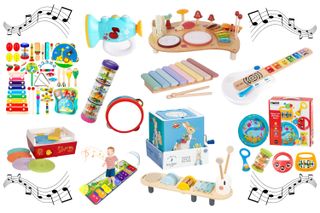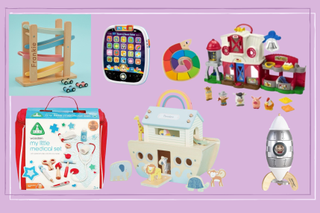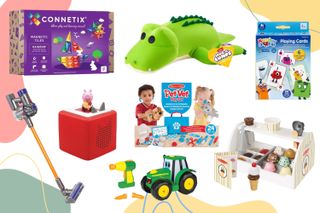Best toys for 18 month olds 2024: 33 age-appropriate buys to support their development
The best toys for 18 month olds are items that keep your little learner learning, developing and, of course — having fun.
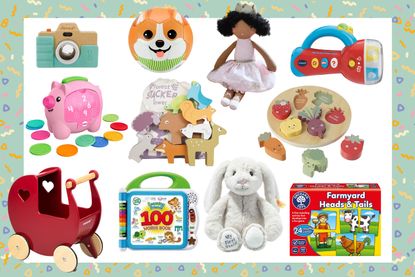
Recent updates
We've updated this guide to the best toys for 18-month-olds to include more quotes from parents, as well as to replace out of stock items.
The best toys for 18-month-olds are fun and seriously engaging for this age group, as they approach important milestones.
By 18 months, most little ones have mastered how to walk, they're climbing and jumping and more, so the best toys for 18-month-olds are items that help them perfect these life skills. For example, stacking and nesting toys can help your infant develop their fine motor skills and are good for cognitive development and problem-solving. Toys designed for this age also help to close the gap between the best toys for 1-year-olds and the best toys for 2-year-olds.
To help you choose the best toys to aid your 18 month old's development, we've trawled cyberspace, used our extensive product knowledge and hands-on experience, as well as the experience of parents in our circle. We've also spoken to experts and read studies to explain the kind of play and toys an 18-month-old needs, as well as the benefits toys can have on children of this age.
Best toys for 18-month-olds
Why you can trust GoodtoKnow.
Sensory toys
Sensory toys are perfect for babies and toddlers (and beyond). These toys are specifically designed to stimulate the five senses, so think fun textures for curious fingers to explore, bright and high contrast colours and toys that make a whole host of interesting sounds. Engaging in sensory play offers a whole host of benefits, from improving fine motor skills and problem-solving skills to promoting independent thinking and aiding language development.
Mum Kate, who has an 18-month-old daughter called Isobel, says: "We'v got a little bubble machine at home and Isobel finds it hilarious. She'll try and catch the bubbles, then clap to try and pop them, which is great to help her practice her hand-eye coordination."
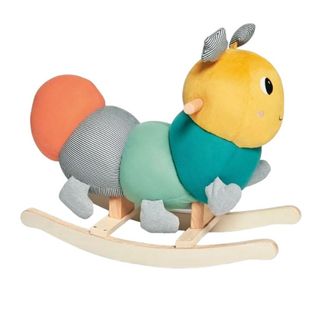
Good for: Physical and auditory development | Batteries required: No
For the 18-month-old who’s always on the move, this cute rocking caterpillar from Mamas & Papas is sure to keep them entertained. The bright colourful character, has a cheery smile, and also has hidden crinkle sounds in its feet and rattling antennae which are great for stimulating your little one’s senses and encouraging exploration.
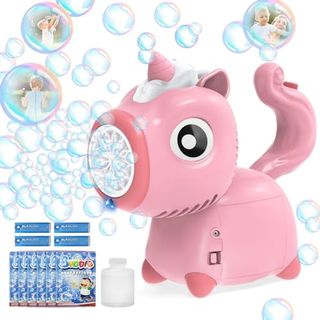
Good for: Sensory play | Batteries required: 4 AA Batteries (included)
This adorable unicorn shaped bubble machine can produce more than 10,000 bubbles per minute, making it a real treat for a 18-month-old's senses. It's not suitable for independent play at this age, but it's a great form of sensory play that you can enjoy with your little one.
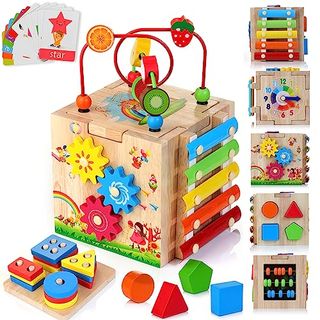
Good for: Cognitive development, fine motor skills | Batteries required: No
This brightly coloured eight-in-one wooden toy is great for a bit of sensory play. There are shapes to sort, which can boost hand-eye coordination, as well as things to grip and twist, which will help develop their pincer movements. There's also a xylophone for them to create their own melodies.
Push-along toys
Whether pushing along from a standing or crawling position, push along toys offer a whole host of benefits for your little one. According to wooden toy retailer Erenjoy, push toys help to build muscles and boost coordination, encourage spatial awareness and problem-solving, while also encouraging creative play. Phew!
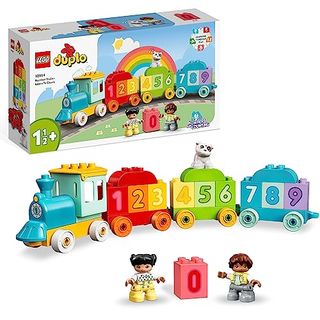
Good for: Cognitive development and fine motor skills | Batteries required: No
Duplo is a great option for busy toddlers and this number train ticks lots of educational boxes too. Bright and colourful, it’s a great introduction to numbers and colours for little ones. Plus, the set also comes with two characters and a dog figure which encourage imaginative play. Our little tester enjoyed opening and closing the roof to put the driver in and pushing the train around.
Grandma Tracey tells us: 'My grandson absolutely loved this Lego Duplo number learning train. We played for a long time putting different numbers on all the little carriages.'
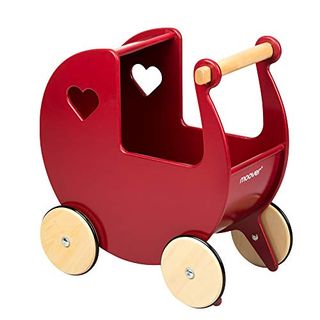
Good for: Gross motor and social skills | Batteries required: No
Now that toddlers are starting to play pretend, it’s the perfect time to introduce a toy pram. The great thing about this wooden pram is that it is heavy enough to be used as a walker, but moves smoothly over floors and carpets. It comes in a variety of colours, including pastels and brights, and has cute heart-shaped cutouts so little ones can check in on who or whatever they are transporting.
Giving it a five-star review, one mum said: "The height is perfect for a toddler and the weight does give some support with those first steps. We've had lots of compliments from friends who have also purchased for their own little ones. It comes ready assembled which is a bonus!"
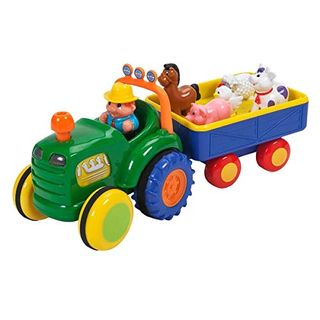
Good for: Cognitive and auditory development | Batteries required: Yes - 3 x AA (included)
If your little one is obsessed with farm vehicles (like tractor toys), they'll love this. It comes with a little farmer and five animals to encourage small world play. As children press each character into their place in the trailer they will hear fun animal sounds which help with recognition. The tractor also makes realistic engine sounds as it’s pushed along, encouraging little ones to practise their motor skills.
Mum of one Grace says: "After initially being a little cautious, my little boy loved pushing this tractor round, and mimicking the noises of the animals."
Stacking Toys and Shape Sorters
At 18 months children are beginning to develop their coordination skills, so stacking, nesting and shape sorting toys make great additions to the toy box. According to a study, up until the age of two, children start to explore objects in relation to other objects - which is key to their cognitive development, and so having to stack or nest objects, or push shapes through the right openings is a perfect way to develop their skills.
These types of toys are also brilliant for developing a child's fine motor skills as they give their grabbing and pincer movements a work out. They're hand-eye coordination will also improve as they successfully stack or sort the objects.
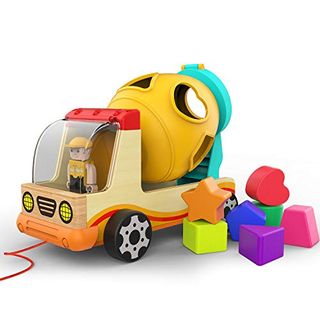
Good for: Cognitive development | Batteries required: No
This classic wooden shape sorter is perfect for problem-solving.The push-along wooden and plastic digger comes with a movable barrel that can be rotated and unloaded meaning it can also be used for imaginative play. The idea is to get your little one to push the shapes through their correct hole, to help perfect their fine motor skills and hand-eye coordination.
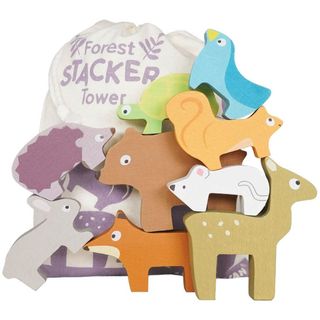
Good for: Creativity and dexterity | Batteries required: None
More complex than stackers your little one might have enjoyed when they were a bit younger, this wooden version requires the animal pieces to be balanced on top of each other, which will help foster their creativity and dexterity. With nine different animal figures, you can help teach your little human about recognising the different creatures and about the environments they live in.
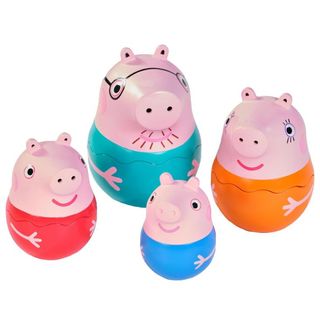
Good for: Cognitive development and fine motor skills | Batteries required: None
By 18 months old, you're little one might have discovered the colourful world of Peppa Pig, and so this nesting toy is a great way for them to get to know the characters and practice their fine motor skills too. The George figure at the centre makes a fun rattling sound, while the halves of the Mummy and Daddy Pig figures are perfect for some playtime in the bath or a sandpit.
Educational toys
Studies show that learning through play is essential to your child's development and that educational toys help to foster cognitive thinking and problem solving. They can also be really useful toys to aid colour, number and shape recognition and boost language skills too. To get the most from educational toys, make sure you choose one that is age appropriate.
Mum-one-Grace says: "Toddlers are like little sponges, learning all the time without realising it. My little boy and I talk all the time when we play and I'm always pointing out colours, shapes and numbers."
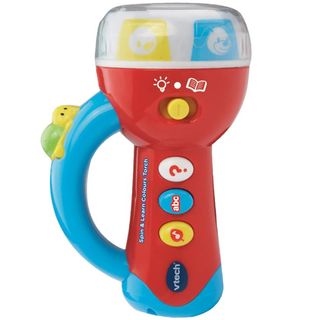
Good for: Auditory and cognitive development | Batteries required: Yes - 2 x AAA (included)
Most toddlers love colourful lights and this is a great way for little ones to also develop their listening skills.
The five different coloured lights and animal graphics create fun visuals to attract a toddler's attention. By turning the ring they can discover different animals and the sounds they make. The three buttons can also be used to learn colours and numbers, as well as play different melodies.
Grandad Martyn explains to us: 'This is a brilliant little torch with a few different modes. It kept an 18-month-old busy for ages.'
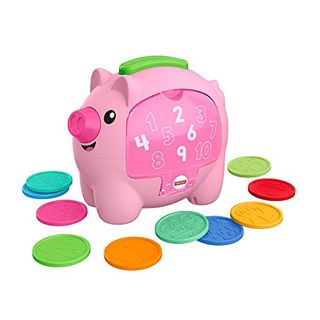
Good for: cognitive development, colour recognition and hand-eye coordination | Batteries required: 3 AA batteries (included)
18-month-olds will love playing with this bright and colourful piggy bank toy. The large coins are perfect for tiny hands to get to grips with, and come in various colours to help develop colour recognition. As the coins are dropped in, piggy will share facts about numbers, counting, colours and opposites, and kiddies can boop the pig's nose for even more fun sound effects.
Little hands can also open the door on the side of the piggy bank to retrieve their coins and start the fun all over again.
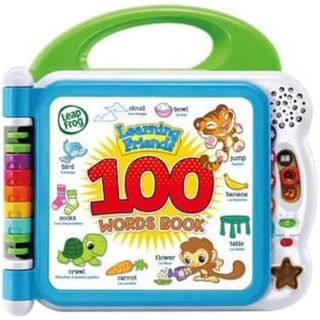
Good for: Cognitive and language development | Batteries required: Yes - 2 x AA (included)
An 18 month old's vocabulary will increase significantly over the next six months and this book is a great way to help reinforce new words. It follows learning friends Turtle, Tiger and Monkey as they introduce little readers to more than 100 age-appropriate words chosen by learning experts.
Touching the words on the pages plays the words and provides fun facts. We also love that everything in the book can be heard in both English and French for a full bilingual experience.
Dolls & Plush Toys
Soft toys and dolls have been staples in toy boxes for generations - and for good reason. Not only can they provide a comfort, but they can also be great when it comes to imaginative play.
Early years practitioner Kirsty Ketley, from Auntie K’s Childcare says: 'Toddlers' social and emotional development will centre around imaginative play. So dressing up and role-play toys are a great idea. These are also great for helping them to make sense of their developing emotions, which will be very strong at times!'
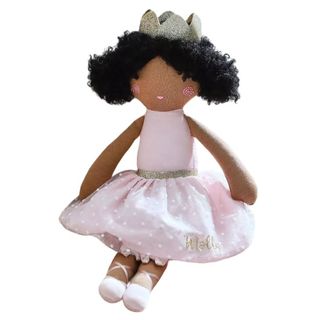
Good for: Social skills | Batteries required: No
As toddlers start to become more aware of the world around them, they'll begin to role-play, and dolls are absolutely perfect for this important type of play. Recreating family life is always a favourite game, and the My 1st Years cuddly dolls are made from super soft, lightweight and machine-washable fabrics so they can be cuddled around the clock, while looking as good as new.
The doll also features a range of fun textures, from satin to net, which makes for some fun exploring for curious hands.
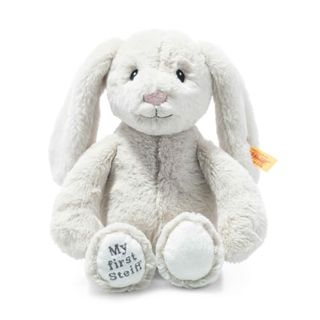
Good for: Social skills | Batteries required: No
If you’re looking for an extra special toy for the 18-month-old in your life, this gorgeous My First Steiff Hoppie Rabbit is the perfect gift. Made of super soft plush, Hoppie Rabbit is sure to become a firm favourite for cuddles. Our little tester, 18-month-old Ted, absolutely loved stroking her long ears.
Hoppie Rabbit is 26cm long and has My First Steiff embroidered on her foot pad. She is available in pink, blue and pale grey. Plus, all parents will be pleased to hear that she is machine washable, so you don’t need to worry about how loved she is!
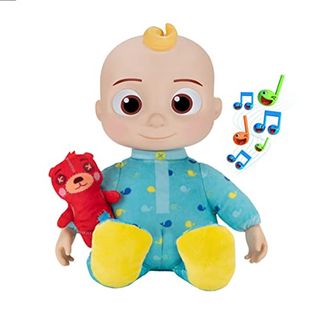
Good for: Social skills | Batteries required: Yes - 3 x AAA (included)
Cocomelon fans will love this soft plush toy inspired by JJ. Wearing his cute onesie and clutching his favourite teddy bear, JJ is ready for bed. This is a great toy to talk to your 18-month-old about bedtime routines and also sings the “Yes Yes Bedtime” song. Plus JJ has seven sounds and phrases your little one can chat along with.
Grandma Sandy tells us: “My granddaughter loves Cocomelon and this did not disappoint! She carries it everywhere and has to have it at bedtime, I would definitely recommend it.”
Musical toys
Musicality can start to develop in the womb, so it's no wonder musical toys are such a hit with babies and toddlers. According to one study, from the age of 12 months, children are 'increasingly able to express themselves musically' through rudimentary dancing, and by 18 months, they might be showing signs of differentiating between speaking and singing - although they're a little way off from following a tuneful melody.
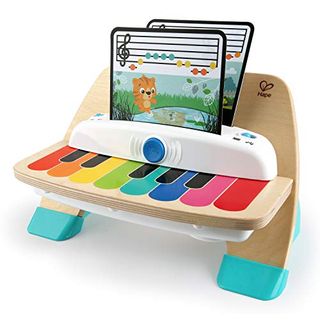
Good for: Auditory and cognitive development | Batteries required: Yes - 3 x AA (included)
This beautiful wooden piano with 11 colourful touch keys is a great first musical instrument for little ones. It comes with five music sheets that play 10 melodies when inserted. So younger children will enjoy trying to play along to the classical music and older ones will have fun composing their own tunes. Suitable from six months up to three years.
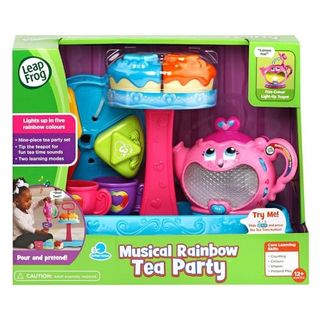
Good for: Cognitive development and social skills | Batteries required: Yes - 2 x AA (included)
The set includes nine tea-time learning songs, and 80 phrases and sounds to help teach colours, opposites, counting and matching. The teapot lights up in five colours and gurgles as tea is ‘brewed’ inside. It’s a great set for role play and learning to take turns. There are also various pieces that need to be fitted together, which can be a great way to practice spatial awareness and shape sorting too.
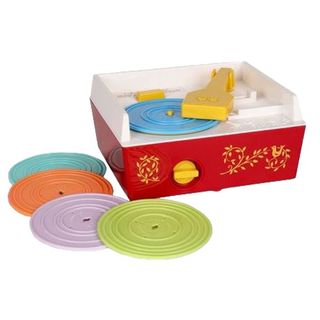
Good for: Sensory play, hand-eye coordination | Batteries required: 3 AA batteries
This classic Fisher Price record player comes with five double-sided records, which play 10 melodies. Little hands can change the records and start the music playing, and enjoy moving their bodies in whatever way feels good when they hear their favourite songs playing. Dad Liam says: 'I had this when I was little and love that I can play with it with my daughter now.'
Wooden toys
When your child is 18 months old, they've likely not yet discovered the vast array of plastic toys available so if you can still get away with more design-conscious and planet-friendly options. (You might also want to read our article on whether wooden toys are better than plastic toys).
Not only are these wooden toys fun to play with and offer the same developmental benefits as plastic alternatives, they can also double up as adorable decor in your little one's bedroom or play room when not in use.
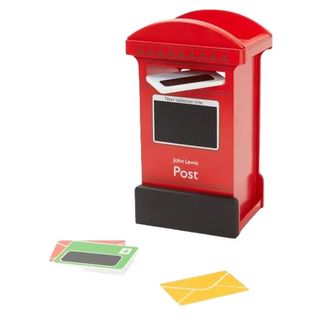
Good for: Fine motor skills and cognitive development | Batteries required: No
If there’s one thing parents of toddlers will tell you they love doing, it’s posting things! So this adorable little post box had to make it onto our list of best toys for 18-month-olds.
As well as helping to develop fine motor skills and hand-eye coordination, this toy also inspires imaginative play. As children get older they’ll enjoy adding names to the front of the letters and writing the collection time on the box with chalk. Plus, when all of the letters are posted they can open up the box and start all over again!
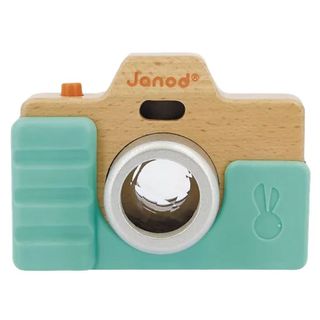
Good for: Cognitive development and social skills | Batteries required: Yes, 2 x LR44 1.5V (included)
Most toddlers will be no stranger to having their photo taken! So this lovely Janod Wooden Sound Camera allows them to get behind the lens and pretend to take their own pictures. Little ones will love to hear the sound of the shot being taken as they press the shutter release button. Plus, they can look out for the flash that follows. There’s also a cute kaleidoscope viewfinder that transforms with different shapes and colours.
We really love the removable silicone shell, which helps your 18 month old to have a better grasp hold of the toy.
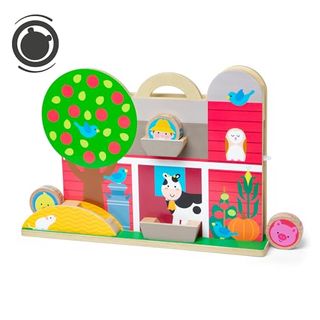
Good for: Fine and gross motor skills | Batteries required: No
At 18 months old, little ones love to start investigating the world around them and this Melissa & Doug Go Tots Barnyard Tumble is a great way for them to explore cause and effect. As well as encouraging imaginative play, this cute set helps to build fine and gross motor skills.
The farm includes six animal and two farmer wooden disks which can be posted down the silo, out the barn door, over the haystack and into the trough. The barn also has a sturdy handle on the top so it can be carried around.
Puzzles and Games
By 18 months old, your little one might be ready to enjoy some simple puzzles or games as part of their play time. As well as being good for cognitive development, games can help teach kids about turn-taking and boost their social skills too.
When it comes to jigsaws, Kirsty Ketley, from Auntie K’s Childcare, says: “Jigsaw puzzles are great for helping to develop problem-solving and memory skills.”
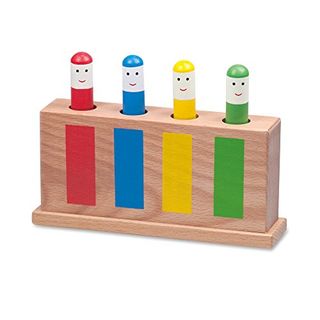
Good for: Cognitive development and hand-eye coordination | Batteries required: No
This cute and simple wooden pop up toy keeps little ones amused for ages. It features four colourful figures which bob up and down on concealed springs and has been designed to encourage hand and eye coordination and introduce colour awareness. Mum Danielle tells us: "I'm using this to help my child develop colour matching skills. He finds the springy pegs funny. It's great to engage with a focused activity."
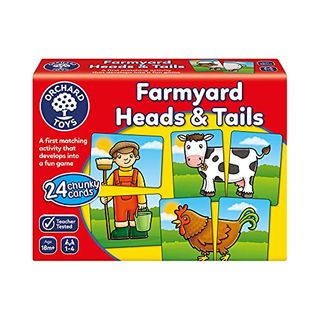
Good for: Matching and memory skills | Batteries required: None
GoodtoKnow's Editor, Anna Bailey, bought this for her daughter Freddie, who loves it. With chunky cards that can withstand the most enthusiastic of players, this game helps to teach kids how things are alike and how they are different. It can be played independently or with others, which can help your child learn important social skills, like turn-taking.
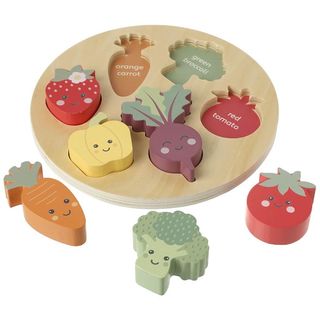
Good for: Fine motor skills, cognitive development | Batteries required: No
18 months is a great age to get little ones interested in jigsaws and this is a perfect introduction to puzzles. Colourful, with fun veggie shapes for little hands to explore, the wooden pieces are chunky enough for a 18-month-old to hold, and the design is a simple way for toddlers to learn to identify different vegetables and colours while learning to improve their concentration.
Outdoor toys
Having fun outdoors, especially when the weather is good, is so fun for 18 month olds. Not only does it encourage activity and offer a screen-free way to spend some time, but all that fresh air can help your tiny human sleep well at night.
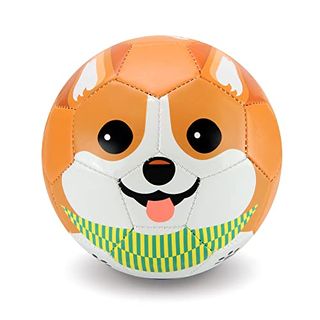
Good for: Gross motor skills | Batteries required: No
As toddlers become more confident on their feet, they’ll start to practise standing on one leg to kick. So these little footballs are the perfect size for an introductory ball.
With a choice of cute characters, including a fox, corgi, zebra, polar bear and unicorn, there will be something to suit every animal enthusiast. The faux leather ball also comes with a pump, making it quick and easy to inflate.
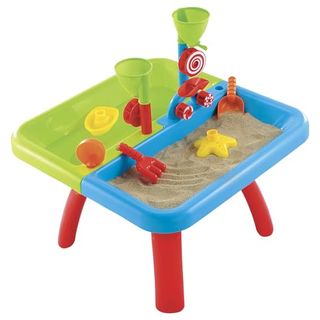
Good for: Sensory play, fine motor skills | Batteries required: None
Sensory play is key to helping an 18 month old discover the world around them through their five senses. This Early Learning Centre table has two compartments where little ones can play with different textures, like water and sand, using the 10 tools and utensils included. It also comes with a lid that turns the pits into a play table with ease.
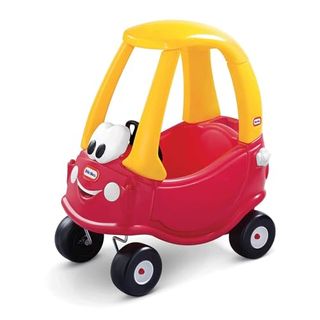
Good for: Role play | Batteries required: None
This Cozy Coupe from Little Tikes is an absolute icon. For 18-month-olds, you can leave the floor board in, and push them around in it, or let them role-play while stationary, but as they grow, you can take the floorboard out, and they can use their feet to propel them wherever they want to go. The working horn adds some realism to the role playing fun.
Interactive books
When it comes to interactive books for babies and toddlers, there is loads of choice available. The three we've picked here are tried and tested by GoodtoKnow's Editor Anna Bailey who bought them for her daughter Freddie, and both give them a massive thumbs up.
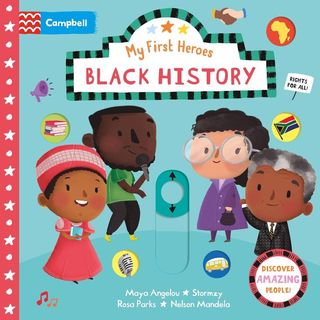
Good for: Fine motor skills, hand-eye coordination | Batteries required: None
Make story time interactive with the My First Heroes collection of books. Child development expert Dr Gummer loves this book collection, saying: "I love the inclusion of interactive features for little hands such as the slides to push and wheels to turn, which add an element of engagement, making learning about diverse and fascinating lives an enjoyable experience.".
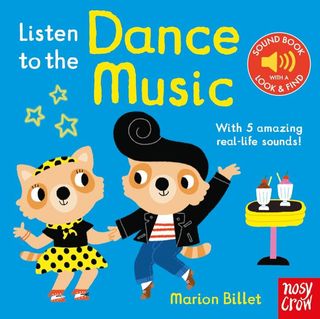
Good for: Sensory play, creativity | Batteries required: AAA batteries (included)
Part of a seven book series, Listen to the Dance Music introduces kids to various music styles, including rock and roll and hip hop. GoodtoKnow's Editor Anna Bailey loves this collection for her infant daughter, Freddie: "We’re a very musical family, and we wanted to encourage our daughter to appreciate it from a young age. It’s so fun seeing her reaction to the different styles, and watching her dance.”
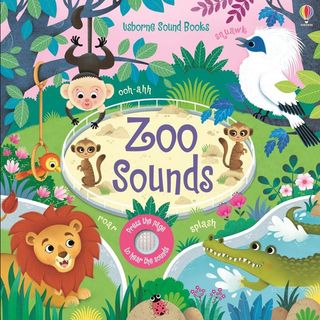
Good for: Cognitive development, hand-eye coordination | Batteries required: Yes (included)
This beautifully illustrated book is part of a 10-book collection, introducing kiddies to sounds from all different environments. This Zoo Sounds book is perfect to help little ones recognise different animals. Mum Anna says: "My daughter loves these - she gets very excited about pushing all the buttons and listening to the animals' noises."
Pop-up play tents, tunnels and pits
Pop-up toys are great because they are assembled in seconds and fold down just as quickly to almost nothing for super easy storage. But when they are up, they are super eye catching and enticing for kiddos. Whether it's a fun tunnel for them to crawl through, a tent they can turn into a den, or their very own ball pit, there's no doubting the pop-ularity of pop-up toys.
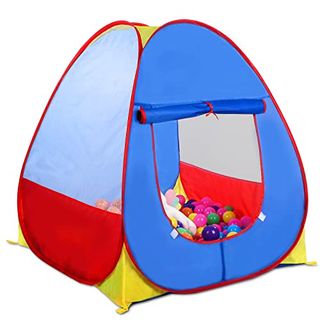
Good for: Role play, fine and gross motor skills | Batteries required: None
This pop-up play tent offers a quick and easy way for your 18-month-old to role play and tap into their creativity. They can make a house with all the favourite stuffed toys, or even treat it as a little shop window. For a different kind of play, you can also add plastic balls (not included) and use it as a ball pit, which can help hone their gross and fine motor skills.
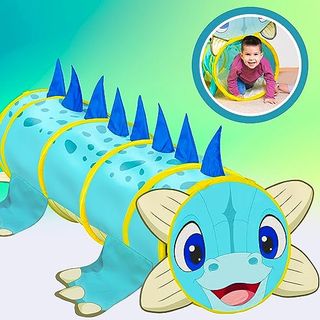
Good for: Gross motor skills, role play | Batteries required: None
If you have an 18-month-old, they'll love exploring this fun (and bestselling) dino tunnel. It's five foot long, and has fun hide and seek flaps at each end, which makes it perfect for games of hide and seek. Suitable for both indoor and outdoor play and with additional padding, it's gentle on little hands and knees so they can play for as long as they want, wherever they want. When play is over, it can be wiped clean and folded flat for easy storage.
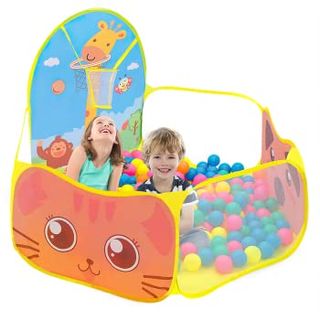
Good for: gross and fine motor skills, hand-eye coordination | Batteries required: None
This fun and colourful ball pit (balls not included) is a brilliant way to keep 18 month olds entertained and boost their motor skills at the same time. It also features a whole host of animals that infants will love to discover and learn about the sounds they make. Plus, there is a fun basketball-style hoop for them to drop the balls through, or even aim at from a distance as they grow.
What kind of play does an 18 month old need?
Children need to engage in different types of play to support the development, and this is no different for infants when they reach the pivotal age of 18-months-old.
At this age, they might be starting to play independently, will adore sensory play and unleash their imagination by role playing and engaging in pretend play. As their gross motor skills develop, physical play might come to the fore, while 18 month olds can also start to engage in cooperative play, where they will learn important social skills alongside their peers.
What kind of toys do 18 month olds play with?
As you can see from our list above, there are a vast array of toys that are perfect for this age, from sensory objects and dolls to musical toys and interactive books. Nicole Ratcliffe, at Baby 2 Sleep, explains that toys that help little ones learn about emotions can be really helpful. "This allows mum or dad to spend one-to-one time with their little one, role play emotions and teach them ways to help them communicate how they are feeling.
"Blocks and stackers are also brilliant. Music for dancing, pop-up tunnels, and obstacles around the house can be great too. They love things that may be noisy, colourful and interactive, and things that challenge them.”
Why are toys important for a toddler's development?
According to studies, toys and games play a very important role in a child's development, contributing to the development of their cognitive, motor, psychosocial, emotional and linguistic skills. Through play, children learn to communicate with others, discovering how to take turns, share, control their emotions, follow rules and solve problems. Beyond that toys also play a key role in raising happy, creative and self confident children too.
How we chose the best toys for 18 month olds
We compiled this list of the best toys for 18 months olds based on our extensive research and product knowledge, as well as our own personal experience or the experience of other mums and infants.
In addition, we spoke to experts, and took into consideration star ratings and customer reviews to ensure we were sharing the best toys around for you to consider for your 18-month-old. As we commit to sharing more sustainable products with you, we also chose wooden products where possible too.
Continue reading
GoodtoKnow Newsletter
Parenting advice, hot topics, best buys and family finance tips delivered straight to your inbox.
Sarah is GoodtoKnow’s Consumer Writer & Money Editor - which means she writes about everything from this year's top toys and the newest toy releases, to discounts on days out and childcare costs. Sarah is passionate about helping mums save money wherever they can - whether that's spending wisely on the right toys and kidswear or keeping on top of the latest news around child benefit, the motherhood penalty. A writer, journalist and editor with more than 15 years' experience, Sarah is all about the latest toy trends and is always on the look out for toys for her nephew or Goddaughters so that she remains one of their favourite grown ups. When not writing about money or best buys, Sarah can be found hanging out with her rockstar dog Pepsi, getting opinionated about a movie or learning British Sign Language.
- Heidi ScrimgeourDeputy Editor
- Becks ShepherdFreelance Writer
-
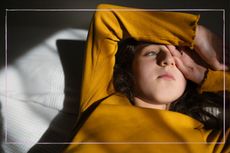 Groundbreaking new research reveals surprising link between neurodivergence and chronic fatigue in kids
Groundbreaking new research reveals surprising link between neurodivergence and chronic fatigue in kidsIs your neurodivergent child always tired? This new study might explain why
By Charlie Elizabeth Culverhouse Published
-
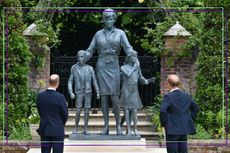 Princess Diana could be about to spark Prince Harry and Prince William’s reconciliation, with adorable 'saved' childhood memory
Princess Diana could be about to spark Prince Harry and Prince William’s reconciliation, with adorable 'saved' childhood memoryThe two princes shared an incredibly close bond growing up
By Charlie Elizabeth Culverhouse Published
-
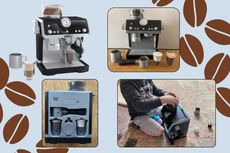 De'longhi Coffee Machine toy review - an impressive replica, but is it worth your money?
De'longhi Coffee Machine toy review - an impressive replica, but is it worth your money?I tested the De'longhi coffee machine toy from Casdon with a four year old - here's our verdict on whether it's worth the £25 price tag
By Sarah Handley Published
-
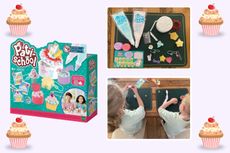 I tested the Pati-School Party Creations Starter Kit with a couple of kids - here's our verdict
I tested the Pati-School Party Creations Starter Kit with a couple of kids - here's our verdictWe review the Pati-School Party Creations Starter Kit to see if it's worth your money
By Sarah Handley Published
-
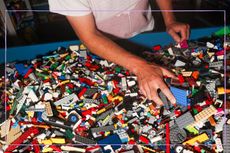 5 most valuable vintage Lego sets, according to a Lego expert - do you own one?
5 most valuable vintage Lego sets, according to a Lego expert - do you own one?These vintage Lego sets could be worth serious cash - here's what to do if you have one at home
By Sarah Handley Published
-
 Last chance to shop the best Prime Day deals for university students, chosen by a fresher's mum
Last chance to shop the best Prime Day deals for university students, chosen by a fresher's mumStudents, assemble! Get your digs kitted out without spending all your finance cheque
By Heidi Scrimgeour Published
-
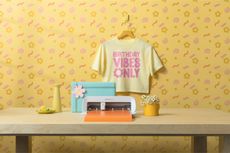 It's not too late! Prime Day ends tonight but these Cricut deals could have you crafting by Christmas
It's not too late! Prime Day ends tonight but these Cricut deals could have you crafting by ChristmasFancy yourself as a crafting queen? These Cricut deals could make your dreams come true
By Heidi Scrimgeour Published
-
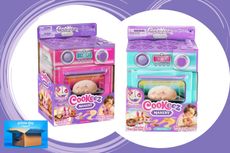 I had hours of fun testing this toy with a six-year-old, and now it's at its lowest ever price for Prime Day
I had hours of fun testing this toy with a six-year-old, and now it's at its lowest ever price for Prime DayCookeez Makery is the toy I wish I had when I was a child, and now it's an absolute bargain in the Prime Day sale
By Sarah Handley Published
-
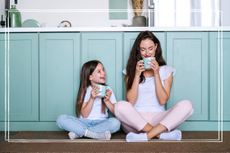 I'm a mum of three and these Amazon subscriptions have eased my mental load
I'm a mum of three and these Amazon subscriptions have eased my mental loadSick of texting 'cat food' to your other half? This is your sign to set up Subscribe & Save
By Heidi Scrimgeour Published
-
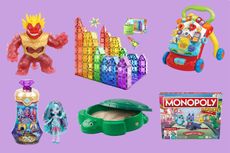 I'm a toy tester and these 35 Amazon Prime Day toy deals are still available, but not for long
I'm a toy tester and these 35 Amazon Prime Day toy deals are still available, but not for longThese Amazon Prime Day toy deals are still live if you want to grab a last-minute bargain
By Sarah Handley Last updated
